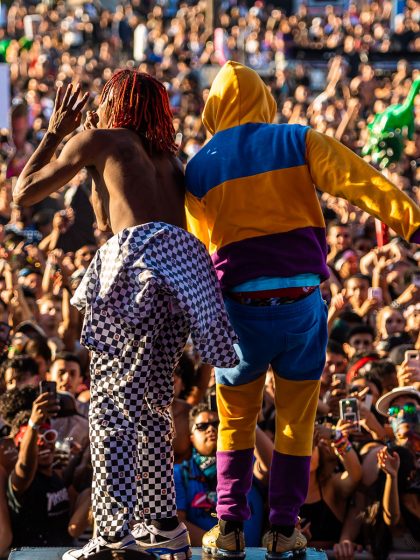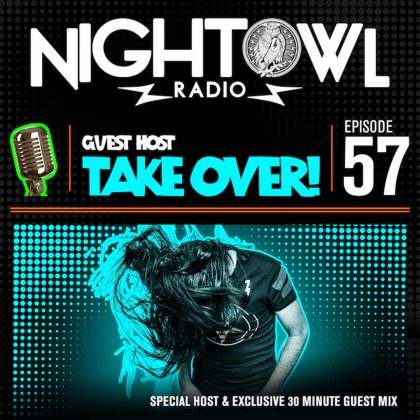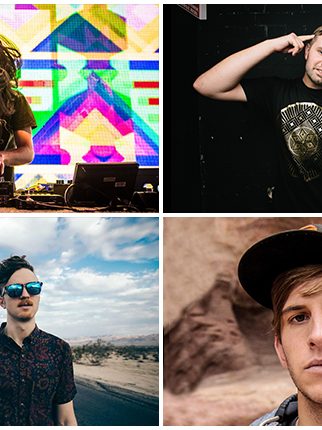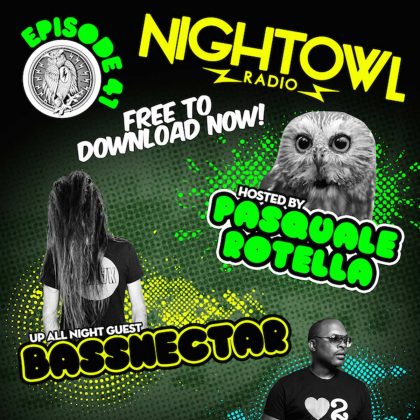Low End Theory: Bassnectar on Twerking, Drugs, and the Spiritual Wasteland of Mainstream Culture
As Bassnectar, Lorin Ashton has been on the forefront of music that hits you directly in the solar plexus since rising through the Bay Area electronic scene in the late ’90s. Today he’s one of the most celebrated bass music producers in the world, combining everything from Michael Jackson and Pennywise with waves of wompy bottom end, and leaving an international community of devoted fans (google “Bassnectar tattoos”) in his sonic wake. Despite the fame (and presumed fortune), a nice-guy reputation precedes him. He even takes song requests for live shows via his website.
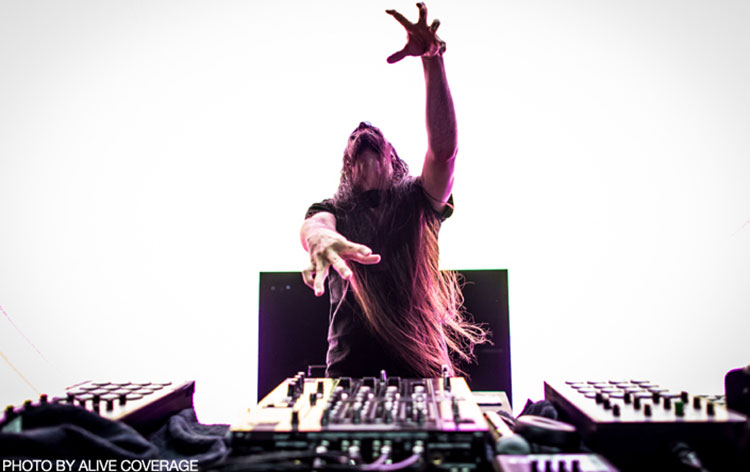
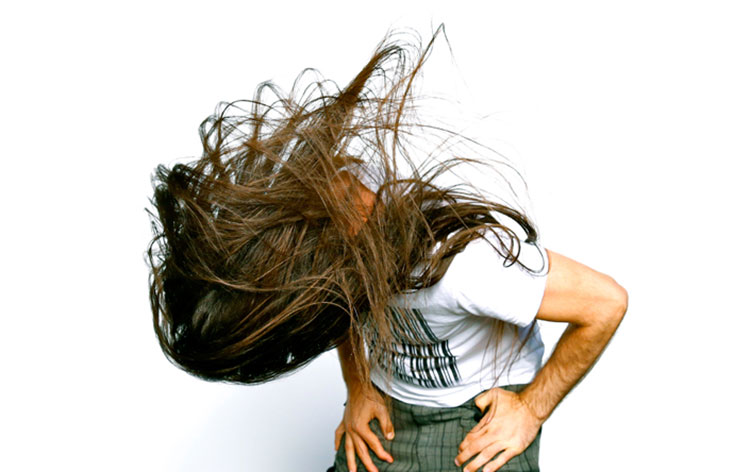
Noise vs. Beauty, a sprawling, inspired collection of tracks, and the 10th Bassnectar LP, was released on June 24. The album features a barrage of guest artists and, as the title suggests, in moments plays as delicately (“Ephemeral“) as it does dirty (“Noise.”) This summer and fall, see Ashton on tour in Europe and the US in support of the album. With October’s Bass Center VIII event, he’ll join the short list of electronic music artists who have played New York’s Madison Square Garden, and he will become the first bass music producer to headline the iconic venue.
We spoke with Ashton about his career.
What you do—the music you make and the experience of hearing it live—seems like a tribal and even a religious thing for people. Why do you think your music, and bass music in general, speaks to people in the way it does?
I was always really attracted to niche, underground scenes. I think it came out of the insecurity of being 13 and not being badass, and wanting to be badass, and wanting to find something that was anti-religious—or to put up a flag and say, “This is my identity. I’m not cut from the cloth that you’re cut from.” And a lot of the time, especially in youth culture, you’re not really that badass; you’re living at your parents’ house and in high school.
I was always gravitating toward what was left of center and what was the road less taken and almost, like, what was really good and what everyone loved, I wouldn’t listen to. I feel like that was foolish of me. I missed out on Radiohead and the Deftones and all of these awesome bands because I only wanted Cannibal Corpse and whatever was the revolting, most satanic music that I could try and scare someone with.
"It’s so silly to me to have 30,000 people facing and worshipping this one dorky human who’s lucky enough to be playing music for everyone else."
How did that evolve into what you do now?
When I got into the rave scene, it was the same way. I wanted to get out of the main room and into the side room and into the obscure shit, or the intelligent shit, or the frightening shit. Just the weird stuff, so it would almost be bragging rights. I do think that’s a bit of an immature attitude—to like something because it’s weird—but that was where I came from. As what I was doing became popular; it [became] a really unnatural and surprising situation for me. I wasn’t used to liking something that a lot of other people liked, and I certainly wasn’t used to being involved any way in mainstream culture. I’m really revolted and frightened by mainstream culture; it makes me feel spiritually alone. Something that I loved about bass music was that it was deep enough, heavy enough, and weird enough that it resembled some kind of alternative. As it became popular and mainstream, it became difficult to balance the two.
At this point I think the dust has settled, and we’re back into where I think of EDM as basically house and trance. To me, it’s really that mainstream sound with the cheesy, schmaltzy guy who sings some barbaric pop lyrics at the chorus; and I feel grateful that that’s what’s blowing up, because it allows bass music to creep off into the side stages when necessary.
I get that, but you play at very mainstream festivals like EDC, and there are a lot of people who go there specifically to see you.
It’s a fun crowd to play to, and in all of my critical attitudes, I’m also a lover of nerds and outcasts. I’m not necessarily trying to find who I can hate here and tease at this festival. It’s a lot of fun to be [at EDC].
So, do you think that’s why EDM is important—because it provides a point of entry for these people to be at big festivals and then maybe wander past your set?
I’d have to think about that thought before I condoned it. EDC and the Insomniac-rave-L.A. vibe were something that I heard about when I was a teenager. They really put a lot of time into the extra special effects and kind of tone down who the DJs are and what the lineup looks like. I think that’s fucking epic.
The more faceless that these DJs can be, the better—myself included—because we’re just playing music that we love. We may be innovating and doing it really well, and that’s great for what we do, but it’s so silly to me to have 30,000 people facing and worshipping this one dorky human who’s lucky enough to be playing music for everyone else.
Do you think your music speaks to people because it touches them in a physical way? You said it’s intellectual music, and it is, but it’s also really physical music because the bass hits the body in a way that you can’t help but feel.
I think part of it is—whether I was an angry pre-teen and listening to “Smells Like Teen Spirit,” or whether I was in my teenage years and wanted to show up to school literally blasting Cannibal Corpse or NWA—some mode of violence or intensity or aggression or power.
I love seeing and knowing that this 16-year-old kid with a Bassnectar tattoo loves this music that I’m making, and that it means so much to him or her. That’s what inspires me to make it—not so much the ego or fame or what I’m going to tweet about. How can I best channel something that’s so emotionally precious and tender and special to me? When you tune into that emotional frequency, does it say the same thing? If it does, it’s like lovemaking on a musical level, even if it’s an ugly sound.
And where does that emotion come from? Is it all your own?
I would love to take as little identity or credit for my music as I can, because I think–and I might be wrong–but I think there’s nothing original about humanity. I think we’re all reflections of previous generations. Whether it’s Elvis stealing musical ideas, or Ray Charles stealing musical ideas, or Mozart stealing musical ideas, I don’t think any one human is born and goes through their life in a bubble and at age 21 has some brand-new, groundbreaking idea. I think they’re taking things that they hated, fixing them, and taking things that they love and trying to push them forward.
There’s also this human urge to be validated through our peers. I think we all just want to connect, and through that urge we end up taking too much credit. I’ve made 10 albums, and with some of those albums, I’ve made such an effort to make every sound myself, master everything myself, and mix everything myself. That was cool, but it was almost more athletic—like bragging rights, so I could say, “Yeah, that was me. I made that.” Now I don’t care. It’s almost like I want to be in a band and work with other humans and collaborate.
Why keep making albums in an era when singles will do?
I didn’t make this album for any other reason than I was just making a lot of music, and I wanted to collect it together. It’s really hard for me to feel like I can represent myself musically with any one idea. It’s kind of like Goldilocks, where something is too hot, and something is too cold, and something is just right. I feel more comfortable with 15 songs because it’s a wide variety. It’s very tender, very ethereal, very sensitive at times, and also very hardcore and loud and noisy at other times, just like life. I’m giving myself a spectrum to play in.
Can you pick a favorite track from the album?
Can you pick a favorite strawberry you’ve ever eaten?
No. Good analogy. Ok, switching gears. I feel like you’re more sensitive to misogyny than other people in the scene.
Why do you feel that?
I saw a Bassnectar T-shirt at Hard Summer last year that said, “Party with Respectable Women.”
I didn’t even make that shirt, but I thought it was cool. I am kind of a feminist. I studied feminist theory in school. I love my mom and my grandma, and if I had a daughter, I would love her and encourage her to put as much independent thought into her life as her looks, as I would encourage my son.
I think that our entire society is so used to telling girls that they’re there to be beautiful and telling guys that the beautiful girls are there for them to fuck. There’s so much social conditioning where young girls are confined to basically playing with dolls and are taught at an early age to wear makeup and be pretty and to like pink. Then you see a lineup of DJs and it’s like, 99% men and most of the female performers are hot, scantily-clad dancers. And I’m not dissing that they’re dancers!
"Although I do wish that females were given more of an opportunity on a musical level, beyond just singing."
On the other hand, you’ve got companies like Google [who] have this huge campaign right now trying to cool-ify programming for women. I think shit like that is amazing. I think it’s better to focus on humanitarian issues and how to make people feel empowered and how to promote community and health and happiness, and if music can align with that, that’s great. I think there are a lot of artists who do that.
Sure, and you can do a lot as an artist to set a precedent and a good example, but like you said, there are girls out there twerking and sticking their asses in the air because they want to. Do you think there’s a fundamental generational difference, or are these just youthful tendencies?
No, I don’t think it’s a generational thing. I’m 36, and many of my friends are belly dancers or strippers or whatever. When I was 18 years old, they were all dressing scantily, if not naked, running around at Burning Man with their asses in the air. Quite honestly, getting one’s ass in the air probably takes great skill and coordination, so I don’t think I am qualified to comment.
"I’m not trying to lead a movement. I am just trying to inspire and promote health and happiness."
Within that, obviously drugs are an issue in the dance music scene. How do you feel about setting a precedent in that way—or do you even feel that’s your responsibility?
I personally started experimenting with psychedelics when I was about 19, and at first, it changed my life in this beautiful way—like unlocking a door. So I stepped through the door and very quickly, within a few years, stopped using drugs to go through the door, because I realized I could go through the door on my own. A lot of my friends didn’t. I have friends who have flipped out on acid or mushrooms and had devastating things happen. I have a friend who did one line of what she thought was cocaine, and it was heroin, and she died instantly and left a child behind. I’ve known friends who have gone from smoking weed every day to doing GHB and speed, and then they die years later of a speed overdose with no teeth in their mouth.
I feel more of a responsibility to friends that I’ve lost, or friends whose lives have been destroyed, or their health is wrecked, or their marriage is gone, or whatever. I wish I had somehow intervened for them before things got bad, and many times I tried, but that doesn’t always work. But I decided I wanted to be as clear and sober as I could be and how fun that could be. I’d go 10 hours a night dancing and going to raves at the beaches and have just as much fun without getting high, more so because I could really participate in each experience, and I could remember my experiences and process on a deeper level. Don’t get me wrong, I love drinking wine; my father is a winemaker, and I don’t really want to have judgments as much as say I promote mental health and clarity and physical health and well-being.
What’s the most rewarding part of your job?
Watching the community build around Bassnectar is humbling. It’s breathtaking. I can see it means so much to so many people, and some fans who have done 50 shows are making plans to go to their 51st. Fans who have done a hundred shows who now just show up and volunteer and pass out water, and marriages that have come around by people who have met at Bassnectar shows, and kids who have been conceived due to relationships made while on tour. It’s beautiful.
There was a headline on a story about you recently that said, “Bassnectar is not a DJ; he’s a movement.” What’s your feeling on that?
I’m not trying to lead a movement. I am just trying to inspire and promote health and happiness.
Follow Bassnectar on Facebook | Twitter

